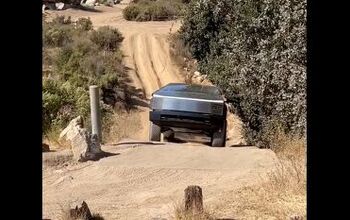Tom Whipple: EVs Rock!
In the Falls Church News-Press, editor and retired CIA analyst Tom Whipple continues with part four of The Future of Our Cars. Unlike the suitably skeptical Victor Juarez G., Whipple finds the plethora of speculative EV announcements nothing but encouraging: "… there is no practical alternative for personal mobility with the speed, flexibility and comfort that we have become accustomed to except the electric car." Assuming battery technology keeps pace, he writes, massive solar, wind, ocean and biomass power will provide enough juice to keep us happily motoring in all shapes and sizes of EVs, plugin hybrids and serial hybrids (which he calls "extended range" vehicles) like the oft-delayed Tesla and Volt. Whipple doesn't mention "Cleantech" by name, but warns that if we can't build a green infrastructure, or reliable batteries, we face an era of austerity and conservation. Perish the thought.
More by Donal Fagan


































Comments
Join the conversation
David, I am with you on the "every molecule" approach. I think a lot of people start talking nuclear because it is the only single solution that would make it. I bring up nuclear because it brings to the front all the folks who want us to go back to reading books by candle light. Or who live in a fantasy world about how much energy is needed for even their life style. If you force those people to be honest, they lose any influence they may have. I also bring up nuclear because I believe the waste could easily be shot into space. Since the waste is usually the first objection, we can then move it along.
Landcrusher, Wind is already cheaper than nuclear in a lot of places, and I suspect the same will be true of PVs and ocean tech in 10-15 years. I don't see why renewables shoudn't be able to supply the world's energy, once the low-hanging efficiency fruit is picked. I suspect that 10 years from now I'll be able to supply my house's electricity from PVs for a reasonable cost. I know someone in the Boston area who is going to be doing this very shortly, with a 20 year payback (he's in the business, hence his willingness to go for such a lousy payback). Blasting the waste into space scares me. Think Challenger.
David, Sure, build all you want. There will not be enough to power Houston. You will need more. That's my point. That is why nuclear is NECESSARY even if not desirable. (Wind is desirable so long as you avoid the pitfalls). The problem has been that many groups want to negate the possibility of nuclear. I always want to find out what those people do for a living. I think they realize that the cost benefit of less energy is good for them and are voting their wallets. For instance, if you are an average musician, your employment opportunities improve if people are returned to having to walk to the pub and listen to the music rather than watch tv or surf. As for the challenger comment, we have to get space shots to be as safe as commercial air travel is today. That is the goal. THEN you put the waste on the rocket. Not before.
Landcrusher, Taking off is always the most dangerous part of flying, and will probably remain so for rocketry. There are, I think, some far out schemes for elevators into space, that I probably read about in wired, which, now that I thikn about it, might be a safe way of getting the stuff off of the planet if that ever works. And despite my confidence that we could use a hell of a lot less energy without interfering with our American quality of life, if the population is really going to reach 9-10 billion people, solar might not be enough. I don't know whether we will need nuclear or not, but I don't think fission should be taken off the table at this point. I simply object to the claim that it has some magical power that renewables don't have. It doesn't. They're all lead bullets IMO. (I suspect you wouldn't disagree.) I'm not sure whether you're using Houston as a metaphor for the space program, or whether you're saying renewables wno't power it, or what. But the electric capacity of the US is 500 nukes worth, so Texas' soon to be 23 nukes of wind is ~4-5%, while Texas is about 7% of the population. So that's very substantial.